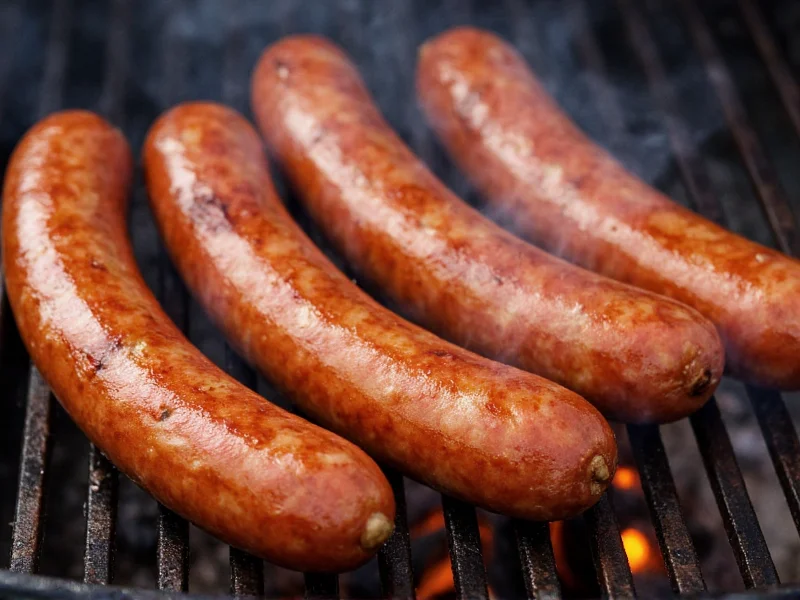Mastering the Art of Grilling Sausage
Grilling sausage transforms simple ingredients into culinary delights when executed properly. Many home cooks struggle with bursting casings, uneven cooking, or dry results, but professional techniques can ensure perfect outcomes every time. Understanding sausage composition—particularly the fat content and casing type—is crucial for successful grilling.
Essential Preparation Steps
Before your sausages hit the grill, proper preparation sets the stage for success. Remove sausages from refrigeration 20 minutes before cooking to eliminate temperature shock. Pat them dry with paper towels to ensure proper browning. For fresh sausages with natural casings, avoid piercing—this common mistake releases precious juices and causes flare-ups. If using pre-cooked sausages, score the surface lightly in a diamond pattern to allow fat rendering without splitting.
Optimal Grill Setup and Temperature
Two-zone grilling provides the ideal environment for sausage perfection. For charcoal grills, arrange coals on one side; for gas grills, light only half the burners. Maintain a medium heat zone (325-350°F) for indirect cooking and a hotter zone (400-450°F) for finishing. This dual-temperature approach prevents the common problem of charred exteriors with raw interiors.
| Sausage Type | Indirect Cooking Time | Direct Heat Finish | Target Internal Temp |
|---|---|---|---|
| Bratwurst | 18-22 minutes | 2-3 minutes per side | 160°F |
| Italian Sausage | 15-18 minutes | 1-2 minutes per side | 160°F |
| Breakfast Sausage | 12-15 minutes | 1 minute per side | 160°F |
| Smoked Sausage | 8-10 minutes | 2 minutes per side | 140°F |
Advanced Cooking Techniques
For authentic flavor development, consider adding wood chips to your charcoal or gas grill. Applewood complements pork sausages beautifully, while hickory enhances beef varieties. When grilling bratwurst vs Italian sausage, remember that thicker sausages require lower temperatures and longer cooking times. Rotate sausages every 5 minutes using tongs—never forks—to maintain even cooking and prevent juice loss.
Doneness Testing and Safety
Visual cues alone cannot determine when sausages are properly cooked. Always use an instant-read thermometer inserted horizontally through the side to check internal temperature. The perfect grilled sausage internal temperature is 160°F for pork and beef varieties, 165°F for poultry sausages. Sausages should feel firm but springy to the touch, with clear juices when properly cooked.
Avoiding Common Grilling Mistakes
Many backyard chefs make critical errors that compromise results. Never place sausages directly over high heat initially—this causes casing rupture. Avoid overcrowding the grill, which creates steam pockets and prevents proper browning. Resist the urge to constantly flip sausages; allow 5 minutes per side for optimal sear development. If flare-ups occur, move sausages to the cooler zone temporarily rather than spraying with water.
Serving and Flavor Pairing
Allow sausages to rest for 5 minutes after grilling to redistribute juices. Serve on toasted buns with complementary toppings—sauerkraut with bratwurst, roasted peppers with Italian sausage. For grilled sausage serving suggestions beyond traditional presentations, try slicing and adding to pasta dishes or breakfast hashes. Pair with crisp lager beers or full-bodied red wines that complement the rich flavors.
Troubleshooting Guide
Experiencing issues with your grilled sausages? If casings are splitting, your grill temperature is too high—reduce heat immediately. For dry results, you've likely overcooked the sausages or pierced them during cooking. If sausages remain raw inside despite browned exteriors, your grill temperature was insufficient—use a thermometer to verify actual heat levels. Uneven cooking typically indicates inconsistent sausage thickness—choose uniformly sized links for best results.
How long should I grill sausages on a charcoal grill?
On a charcoal grill, cook sausages indirectly for 15-20 minutes at 325-350°F, turning every 5 minutes, until they reach 160°F internal temperature. Finish with 2-3 minutes over direct heat for caramelization. Total time typically ranges from 18-25 minutes depending on sausage thickness.
Should I boil sausages before grilling?
Boiling sausages before grilling is unnecessary and often detrimental. Modern sausages are formulated to cook properly without pre-boiling. Parboiling can cause casings to separate and results in mushy texture. The two-zone grilling method provides even cooking without pre-boiling.
What's the best sausage type for beginners to grill?
Pre-cooked smoked sausages are ideal for beginners as they're more forgiving with timing. Among fresh sausages, high-quality bratwurst with natural casings offers good margin for error. Avoid thin breakfast links initially, as they require more precise timing to prevent drying out during the grilling process.
How can I prevent flare-ups when grilling sausages?
To prevent flare-ups, trim excess fat before grilling, maintain medium heat (325-350°F), and use a two-zone grill setup. If flare-ups occur, move sausages to the cooler zone temporarily. Never spray water on flare-ups as this creates steam that can cause burns. Regularly clean your grill grates to prevent accumulated grease from causing excessive flames.
Can I grill frozen sausages directly?
Grilling frozen sausages directly is not recommended as it leads to uneven cooking—charred exteriors with raw centers. Always thaw sausages in the refrigerator for 24 hours before grilling. If you must cook from frozen, significantly reduce grill temperature and double the indirect cooking time, checking internal temperature frequently to ensure food safety.











 浙公网安备
33010002000092号
浙公网安备
33010002000092号 浙B2-20120091-4
浙B2-20120091-4